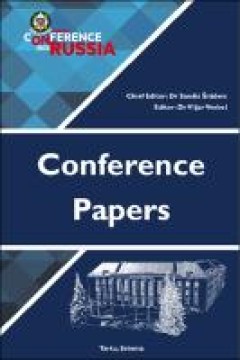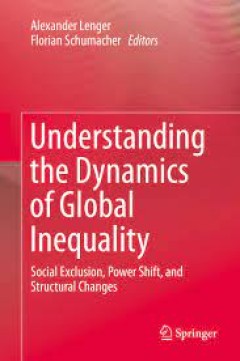Filter by

The Russia Conference Papers 2021
This publication discusses Russia’s foreign, security, defence, and military policies from both Euro-Atlantic and Russian perspectives. More importantly – this work acts as an essential platform for analysing the security challenges linked with Russia and the required responses of the Euro-Atlantic community to the complex challenges posed by Russia’s actions in the region and on a global…
- Edition
- Ed. 1
- ISBN/ISSN
- 9789949035687, 9789949035694
- Collation
- 188
- Series Title
- -
- Call Number
- 327 RUS r

Understanding the Dynamics of Global Inequality Social Exclusion, Power Shif…
Despite the fact that the globalization process tends to reinforce existing inequality structures and generate new areas of inequality on multiple levels, systematic analyses on this very important field remain scarce. Hence, this book approaches the complex question of inequality not only from different regional perspectives, covering Africa, Asia, Europe, Latin and Northern America, but also …
- Edition
- -
- ISBN/ISSN
- 978-3-662-44766-6
- Collation
- -
- Series Title
- -
- Call Number
- -

Understanding Social Justice in Rural Education
This book explores what social justice looks like for rural schools in Australia. The author challenges the consensus that sees the distribution of resources as the panacea for the myriad challenges faced by rural schools and argues that the solution to inequality and injustice in rural settings has to take into account other important dimensions of social justice such as recognition and associ…
- Edition
- -
- ISBN/ISSN
- 978-1-137-50515-6
- Collation
- -
- Series Title
- -
- Call Number
- -

New hope for the poor: A perspective on the church in informal settlements in…
Empowering the poor remains an essential part of the Christian Gospel. The way in which the absolute poor in informal settlements in Africa can be empowered by the message of the Bible, needs to be researched. During research completed in informal settlements near Bloemfontein, Free State Province, South Africa, it has been established that the churches present in the situation are best equippe…
- Edition
- Ed. 1
- ISBN/ISSN
- -
- Collation
- 146
- Series Title
- -
- Call Number
- 208 VER n

Global wine markets, 1860 to 2016: a statistical compendium
Until recently, most grape-based wine was consumed close to where it was produced, and mostly that was in Europe. Now more than two-fifths of all wine consumed globally is produced in another country, including in the Southern Hemisphere, the USA and Asia. This latest edition of global wine statistics not only updates data to 2016 but also adds another century of data. The motivation to assembl…
- Edition
- Ed. 1
- ISBN/ISSN
- 9781925261660
- Collation
- -
- Series Title
- -
- Call Number
- 382 AND g

Music Practices Across Borders (E)Valuating Space, Diversity and Exchange
Klavier plus Streichquartett. Im vierstelligen Bereich sind Werke bekannt. In mittlerer dreistelliger Zahl als Tonaufnahme zugänglich. Über 200 Jahre kontinuierliche Produktion. Bis heute. Und doch fehlt das Genre weitgehend in den Leitmedien Klassischer Musik. In den meinungsführenden Feuilletons und Musikgeschichtswerken. Und in den Programmen der prestigeträchtigen Rundfunksender und Lab…
- Edition
- -
- ISBN/ISSN
- 9783839446676
- Collation
- -
- Series Title
- -
- Call Number
- -

Higher Education in Romania: Overcoming Challenges and Embracing Opportunities
This open access book includes a series of relevant policy research articles, elaborared in the framework of the “Quality in higher education: internationalisation and databases to enhance the Romanian education system” project, implemented by the Executive Agency for Higher Education, Research, Development and Innovation Funding (UEFISCDI), together with the Ministry of Education. The proj…
- Edition
- -
- ISBN/ISSN
- 9783030944964
- Collation
- -
- Series Title
- -
- Call Number
- -

Womanpriest Tradition and Transgression in the Contemporary Roman Catholic C…
"This book is openly available in digital formats thanks to a generous grant from the Andrew W. Mellon Foundation. While some Catholics and even non-Catholics today are asking if priests are necessary, especially given the ongoing sex-abuse scandal, The Roman Catholic Womanpriests (RCWP) looks to reframe and reform Roman Catholic priesthood, starting with ordained women. Womanpriest is the firs…
- Edition
- -
- ISBN/ISSN
- 9780823288274
- Collation
- -
- Series Title
- -
- Call Number
- -

First Nationalism Then Identity: On Bosnian Muslims and Their Bosniak Identity
First Nationalism Then Identity focuses on the case of Bosnian Muslims, a rare historic instance of a new nation emerging. Although for Bosnian Muslims the process of national emergence and the assertion of a new salient identity have been going on for over two decades, Mirsad Kriještorac is the first to explain the significance of the whole process and how the adoption of their new Bosniak id…
- Edition
- -
- ISBN/ISSN
- 9780472075508
- Collation
- -
- Series Title
- -
- Call Number
- -

Children’s Constitutional Rights in the Nordic Countries
This study explores whether and how enshrining children’s rights in national constitutions improves implementation and enforcement of those rights by comparing Danish, Finnish, Icelandic, Norwegian and Swedish law. Readership: All interested in children’s rights, human rights and constitutional law. Politicians, academic libraries, researchers, students, practitioners in law.
- Edition
- -
- ISBN/ISSN
- -
- Collation
- -
- Series Title
- -
- Call Number
- -
 Computer Science, Information & General Works
Computer Science, Information & General Works  Philosophy & Psychology
Philosophy & Psychology  Religion
Religion  Social Sciences
Social Sciences  Language
Language  Pure Science
Pure Science  Applied Sciences
Applied Sciences  Art & Recreation
Art & Recreation  Literature
Literature  History & Geography
History & Geography